
HOME
INTRO
SYMBOLS
ALMANAC
ECONOMY
GEOGRAPHY
STATE MAPS
PEOPLE
FORUM
NEWS
COOL SCHOOLS
STATE QUIZ
STATE LINKS
BOOK STORE
MARKETPLACE
GUESTBOOK
CONTACT US


Tweet
Double click on word for definition.
Vermont State Animal
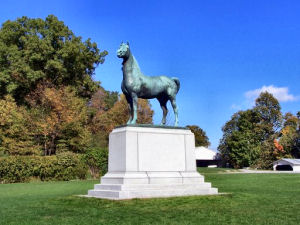
Vermont State Animal: Morgan Horse
Statue of Figure (1789-1821) at UVM Morgan Horse Farm
All Morgan horses can trace their lineage back to Figure
According to accounts, the impetus to name the Morgan horse the official state animal of Vermont was provided by efforts in Massachusetts to name the Morgan horse their state horse.
In fact, the sire of the Morgan horse line, Figure, was born in Springfield, Massachusetts, but wasn't bred until he passed into the possession of Justin Morgan and took up residency on Morgan's farm in Randolph, Vermont. Though born in Massachusetts, it was in Vermont that Figure grew to be the foundation for the Morgan horse breed.
Marilyn Childs, former Director of the American Morgan Horse Association and Amber Broderick former Director of the National Museum of the Morgan Horse in Middlebury, Vermont, agree that it was Deane C. Davis, prior to his term as governor of Vermont, who was instrumental in the adoption of the Morgan horse as Vermont's official animal. Mr. Davis owned and showed Morgan horses and served as chairman of the Vermont Morgan Horse Association and, later, the American Morgan Horse Association.
A statue of Figure is featured at the University of Vermont's Morgan Horse Farm in Weybridge, Vermont. Figure died at the age of 32 and is buried in Tunbridge, Vermont.
House Bill No. 106 was crafted to honor the Morgan horse by making it an official symbol of the state.
After passage by the Vermont State Legislature, House Bill No. 106 was signed by Governor F. Ray Keyser, Jr. and the Morgan horse became the official state animal of Vermont.
No. 42 of the acts of 1961, effective March 23, 1961, designated the Morgan Horse as the official State Animal. The forebear of all Morgan horses was a rugged little stallion which belonged to Justin Morgan of Randolph, a late-18th-century teacher of singing and penmanship and a composer of some renown.
From this exceptional horse sprang a new breed which traditionally could "outdraw, outrun, and outtrot" any other horse.
By the mid-1800's, the Morgan horse had proven its many virtues throughout the expanding nation. Today, the Morgan breed, still bearing the unique traits of its Vermont sire, is one of the favorite saddle, family and endurance breeds in America.
-------- from Office of the Secretary of State,
Vermont Legislative Directory and State Manual,
Biennial Session, 1993-1994, p. 14.
Vermont Law
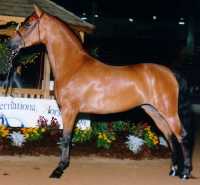
Vermont State Animal: Morgan Horse
ALLPOSTERSURL
The following information was excerpted from the Vermont Statutes Online, Title 1, Chapter 11, Section 500.
Title 1: General Provisions
Chapter 11: FLAG, INSIGNIA, SEAL, ETC.
1 V.S.A. § 500. State animal
§ 500. State animal
The state animal shall be the Morgan horse. (1961, No. 42, § 1, eff. March 23, 1961.)
Sources...
Carpenter, Greg. What Makes Vermont Special. Manchester Center: Shires Press, 2012. Print.
"Vermont Emblems, Facts and Figures." Vermont Department of Libraries. State of Vermont, n.d. Web. 19 Feb 2012. .
"Vermont Statutes Annotated." LexisNexis, a division of Reed Elsevier Inc.. LexisNexis, a division of Reed Elsevier Inc., n.d. Web. 20 Feb 2012.
Shearer, Benjamin F. and Barbara S. State Names, Seals, Flags and Symbols: A Historical Guide Third Edition, Revised and Expanded. Westport, Conn: Greenwood Press, 3 Sub edition, 2001.
Additional Information
JUSTIN MORGAN: The Vermont Morgan Horse Association, Inc. was organized in 1966 to promote and celebrate the Morgan horse, the Vermont state animal.
University of Vermont Morgan Horse Farm: Designated as a National Historic Site, the farm is also home to significant Morgan history and a variety of educational programs. For over 50 years, the farm has provided educational experiences and training for students and visitors while perpetuating the Battell, Government, and UVM bloodlines.
National Museum of the Morgan Horse: Dedicated to preserving and interpreting all aspects of the MORGAN horse breed through educational programs, exhibits and special events.
Vermont Morgan Horse Association: The Vermont Morgan Horse Association (VMHA) was organized in 1966 to promote and celebrate the Morgan horse, the Vermont state animal.
The American Morgan Horse Association: The American Morgan Horse Association (AMHA) exists to preserve, promote, and perpetuate the Morgan horse.
The Morgan Horse Heritage Foundation: Vermont Morgan Horse Heritage Days continues this tradition every summer when we join together at Tunbridge Fairgrounds, long a meeting place for Morgan lovers from across the country.
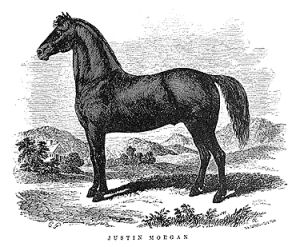
Vermont State Animal: Morgan Horse
Woodcut: Justin Morgan (Figure)
Equus caballus (horse): The University of Michigan Museum of Zoology: Animal Diversity Web.
Equus caballus - (Linnaeus, 1758), Horse: A network connecting science with conservation - NatureServe Explorer: An Online Encyclopedia of Life.
Equus caballus Linnaeus, 1758: Integrated Taxonomic Information System (ITIS) Here you will find authoritative taxonomic information on plants, animals, fungi, and microbes of North America and the world.
State animals: Complete list of official state animals from NETSTATE.COM.
State mammals: Complete list of official state mammals from NETSTATE.COM
More symbols & emblems: Complete list of official Vermont state symbols from NETSTATE.COM.
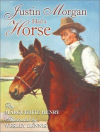
Justin Morgan
Had a Horse
Marguerite Henry
Justin Morgan Had A Horse, by Marguerite Henry, Illustrated by Wesley Dennis. Reading level: Ages 4-8, Hardcover: 176 pages, Simon & Schuster Children's Publishing (October 1, 2002). This is the extraordinary tale of a little workhorse, who, after being born in obscurity, becomes one of the greatest breeding stallions of all time. In this true story Newbery Medal-winning author Marguerite Henry and artist Wesley Dennis celebrate the life of the only horse ever to establish a breed all by himself -- the Morgan.
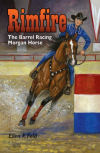
Rimfire
Ellen F. Feld
Rimfire: The Barrel Racing Morgan Horse (Morgan Horse Series), by Ellen F. Feld. 206 pages. Publisher: Willow Bend Publishing; First edition (September 1, 2009) Reading level: Ages 9-13. Rimfire, the sixth book in the Morgan Horse series, takes readers to a whole new realm within the world of horses. When Heather travels to Oklahoma to visit family friends, she is introduced to barrel racing. Falling in love with this quick-paced sport, Heather is thrilled when she returns home and discovers Rimfire, a fabulous Morgan barrel racer that just happens to be for sale. When her parents refuse to buy yet another horse, Heather convinces her friend Nicholas to purchase Rimfire.
Cherry Hill's Horse Care for Kids: Grooming, Feeding, Behavior, Stable & Pasture, Health Care, Handling & Safety, Enjoying, by Cherry Hill. Reading level: Ages 4-8, Hardcover: 128 pages, Storey Publishing, LLC (August 5, 2002). The comprehensive guide helps children and their parents choose the right horse and gives guidelines for safe handling and proper care.
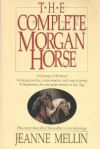
The Complete Morgan Horse
Jeanne Mellin
The Complete Morgan Horse, by Jeanne Mellin. 372 pages. Publisher: American Morgan Horse Association, Incorporated (December 1995) The definitive book on the history, training, and uses of the Morgan breed. The ideal book for new Morgan owners. Written and illustrated by breeder Jeanne Mellin Herrick.
The history of this versatile horse is traced from Justin Morgan to the present. Breed characteristics, conformation, breeders guidelines, influential bloodlines, preparation and performance in the show ring are discussed.
Morgan Horses: a Premium Essay on the Origin, History and Characteristics of This Remarkable American Breed of Horses, by D.C. Linsley. Publisher: C. M. Saxton and Co. (1860).
Horsekeeping Almanac: The Essential Month-by-Month Guide for Everyone Who Keeps or Cares for Horses, by Cherry Hill. Paperback: 576 pages, Storey Publishing, LLC; 1 edition (October 16, 2007). Keeping horses healthy and happy is all about establishing good routines and following the natural cycles of the animals and the land. Nobody knows this better than Cherry Hill, professional horsekeeper, lifelong horse lover, and author of more than 30 books on horses.
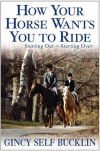
How Your Horse Wants You to Ride: Starting Out, Starting Over, by Gincy Self Bucklin. Hardcover: 432 pages, Howell Book House (October 15, 2004) In this breakthrough guide, renowned riding expert Gincy Self Bucklin offers adult riders a unique, proven method for developing a good physical, mental, and emotional relationship with a horse.
What Your Horse Wants You to Know: What Horses' "Bad" Behavior Means, and How to Correct It, by Gincy Self Bucklin. Paperback: 208 pages, Howell Book House (October 3, 2003). This is a book for everyone who has ever looked at the constantly increasing list of methods and systems marketed as "horsemanship" and wondered which of the many possible approaches would be most suitable for a particular behavior problem.
More How Your Horse Wants You to Ride: Advanced Basics, The Fun Begins, by Gincy Self Bucklin. Hardcover: 339 pages, Howell Book House (March 6, 2006) This follow-up to How Your Horse Wants You to Ride helps intermediate to advanced riders improve their communication with their mounts and polish their overall riding skills. Readers get a complete tutorial "much of which can be found nowhere else" on taking their riding skills to the next level.
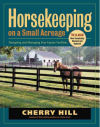
Horsekeeping on a Small Acreage: Designing and Managing Your Equine Facilities, by Cherry Hill. Hardcover: 320 pages, Publisher: Storey Publishing, LLC; 2 edition (March 1, 2005) Effective management requires knowledge, dedication, and a sincere interest in the well-being of horses. In this thoroughly updated second edition of her best-selling classic, Cherry Hill explains how to be a responsible steward of the land while providing horses with the best care possible.
How to Think Like A Horse: Essential Insights for Understanding Equine Behavior and Building an Effective Partnership with Your Horse, by Cherry Hill. Hardcover: 176 pages, Storey Publishing, LLC (May 1, 2006) Horse trainer and instructor Cherry Hill believes that every human/horse relationship benefits from a greater human understanding of what motivates horses, how they experience the world, what makes them happy, and what worries them.

